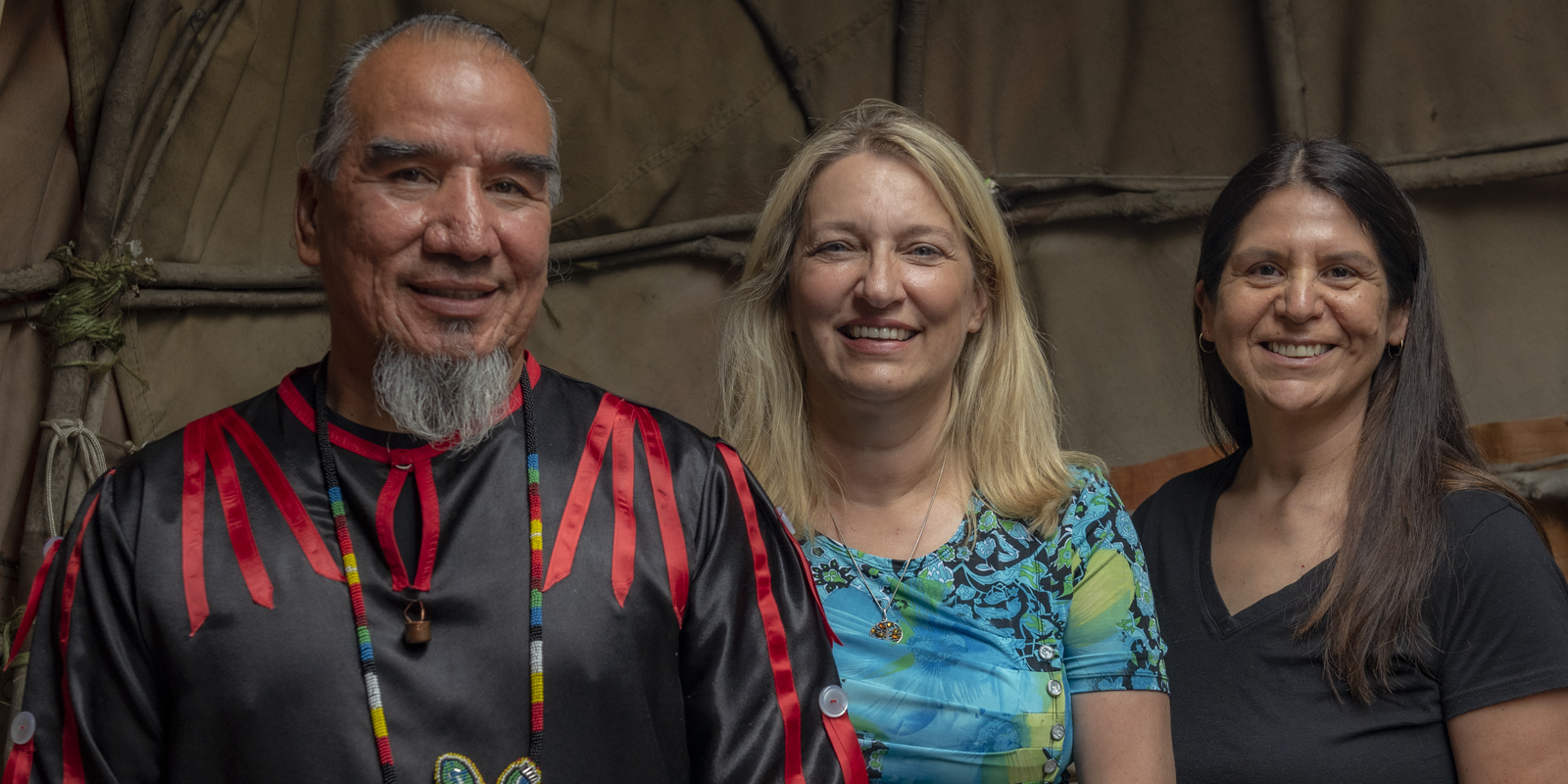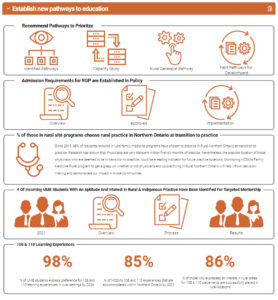Collaborative Specializations
what they are, and why they matter so much

Racism in medicine, physician shortages, and lack of access to French-language health care is fueling a new group of medical students—future doctors who will be committed to improving health outcomes in Northern Ontario.
In 2021, NOSM University introduced new Collaborative Specializations in Indigenous health and rural generalism and launched a pilot project for Francophone health—all specializations taken concurrently with the MD program. Guided by NOSM University faculty across the region, these programs are ideal for medical students who have an interest in, and commitment to, Indigenous, Francophone and rural generalist care.
These specializations provide unique opportunities to complement what future physicians are learning in the NOSM University curriculum, and students must successfully complete both programs to graduate with an MD and specialization.
Indigenous Peoples’ Health and Wellness Collaborative Specialization
There are many vibrant Indigenous cultures, people and communities in Northern Ontario, and many of them have been actively teaching and hosting NOSM students. However, racism and health disparities still permeate much of the health-care system in Canada.
In Northern Ontario, and across the country, Indigenous peoples experience worse health outcomes than non-Indigenous peoples. This is made worse by lower socio-economic status, food insecurity, lack of access to safe drinking water, intergenerational effects of The Residential School System, Missing and Murdered Indigenous Women and Girls, The Sixties Scoop and other colonial effects. Many Indigenous peoples also lack access to culturally safe health services, especially in remote or fly-in Northern communities.
Out of Sight, a report released after an inquest into the death of 45-year-old Brian Sinclair, details systemic failures at many levels. Sinclair, a First Nations man, was ignored for 34 hours in the emergency department of a hospital in Winnipeg.
The inquest found that medical staff made incorrect assumptions about his personal circumstances—including that he was intoxicated or homeless and looking for a place to sleep—and they ignored his health emergency based on stereotypes. Sinclair died waiting in his wheelchair as a direct result.
His autopsy showed that had a treatable bladder infection when he arrived at the hospital, but succumbed to sepsis without the treatment he needed.
In the 14 years since Sinclair’s death, many similar stories of racism in medicine have emerged across the country.
To improve care for Indigenous patients, in September 2021, NOSM University welcomed eight first-year medical students to a new academic program that welcomes both Indigenous and non-Indigenous students who seek additional training on how to provide culturally safe care to Indigenous patients. More students will start each autumn. This specialization—the first of its kind in Canada—is designed to address the health-care needs of Indigenous peoples using community-engaged Indigenous teachings to enhance students’ competency to provide safe, compassionate care.
Students complete all required courses for the MD program and write and pass all the same exams. In addition, students will participate in experiential and participatory learning activities in northern, rural and remote contexts focused on the following topics:
- Foundational teachings in Indigenous Knowledge and healing
- Mentorship with Indigenous physicians and Indigenous Knowledge Keepers
- Trauma-informed care
- Interprofessional collaboration for Indigenous health
- Advocacy and leadership
- Knowledge keepers, faculty and students are already beginning to create a community of practice who are connected through their passion for Indigenous health and wellness. It is hoped that the ripple effects of this specialization will go beyond those who are directly involved in receiving this training and their future patients, by helping to improve systems and where graduates become leaders and advocates.
Rural Generalist Collaborative Specialization
In communities across Northern Ontario, the impact of physician shortages is unmistakable. Many rural and remote communities have long struggled with finding and keeping doctors. The lack of these physicians has left Northern people with greater difficulty accessing primary care and other medical services.
Recognizing the ongoing need to effectively train a “fit for purpose” workforce to move rural health systems from fragile to flourishing, the Rural Generalist Pathway was recently launched at NOSM University. The Rural Generalist Collaborative Specialization was also launched as a portion of the pathway during MD training.
This specialization provides enriched learning experiences for MD students who have a desire to become a rural generalist family physician. Through mentorship, targeted skills development, priority placements in rural communities, and opportunities to explore the complex and changing nature of and influences on rural practice, future physicians will learn and be prepared for what it takes to be a rural generalist family physician— physicians who provide comprehensive primary-care as well as work in rural hospitals, ERs, and provide other enhanced services.
The specific requirements of rural generalists may differ depending on the unique context of rural communities. Graduates from the rural generalist collaborative specialization will have an understanding of their role in communities and the ability to be agile and adapt to changing community needs.
A broad scope of practice, excellent clinical skills, the humility to work with and to understand community needs and to seek to collaborate are the keys to becoming a rural generalist. At NOSM University, there is an emphasis on developing relationships and learning in community and clinical settings where graduates might someday choose to practise.
Francophone Curriculum Pilot
French language service rights through much of Northern Ontario are enshrined in the province’s French Language Services Act. That’s in part because people who speak a minority language must be able to communicate as effectively as possible with health care practitioners. An inability to share and receive critical information about one’s health can have dangerous and even deadly outcomes.
Medical students who enroll in the Voie vers la médecine en français pilot (Francophone Curriculum Pilot) demonstrate a commitment to improving health outcomes for all Franco-Ontarians.

Throughout the MD four-year program, students participate in enriched learning and experiences that emphasize the importance of offering and delivering health services in French.
This pilot program, launched in September 2022, integrates dedicated learning experiences throughout the four-year program that will contribute to preserving and solidifying Francophone students’ cultural and linguistic identity, while they build their confidence in becoming highly competent Francophone physicians.
The Voie vers la médecine en français pilot will also identify Francophone faculty members who can provide guidance and on-going mentorship to NOSM University medical students across the region. In parallel, both physician faculty and students can build a strong advocacy and leadership network in support of a sustainable approach to patient-centered and culturally safe care for all Francophones.
Students participating in the pilot this year will practice interacting with and taking a patient’s history in French, learn medical terminology, and engage in group learning sessions in French.
Future learning and experiences include:
- Structured mentoring opportunities with practising Francophone physicians;
- Priority access to clinical placements in Francophone settings;
- Increased focus on advocacy for Francophone patients and communities to identify unique challenges related to the delivery of French-language health services;
- Targeted development of leadership skills needed to understand and influence health systems; and,
- Increased opportunities for French-language experiences of interprofessional, multicultural and immersive learning, integrated into urban, rural and remote contexts.

The integration of the Voie vers la médecine en français pilot into NOSM University’s MD curriculum is a transformative approach to educating French-speaking physicians; increasing French language health human resources will also lead to improved access to care for Francophone patients.
The curriculum is grounded in an ethical and collaborative space that respects Francophone culture, integrates evidence-based and practise-informed strategies that mitigate health-care gaps and ultimately produces physicians committed to supporting the provision of safe care for all Franco-Ontarians.
Hear more about why the program was created, and what drew four future NOSM University graduates to this program.
